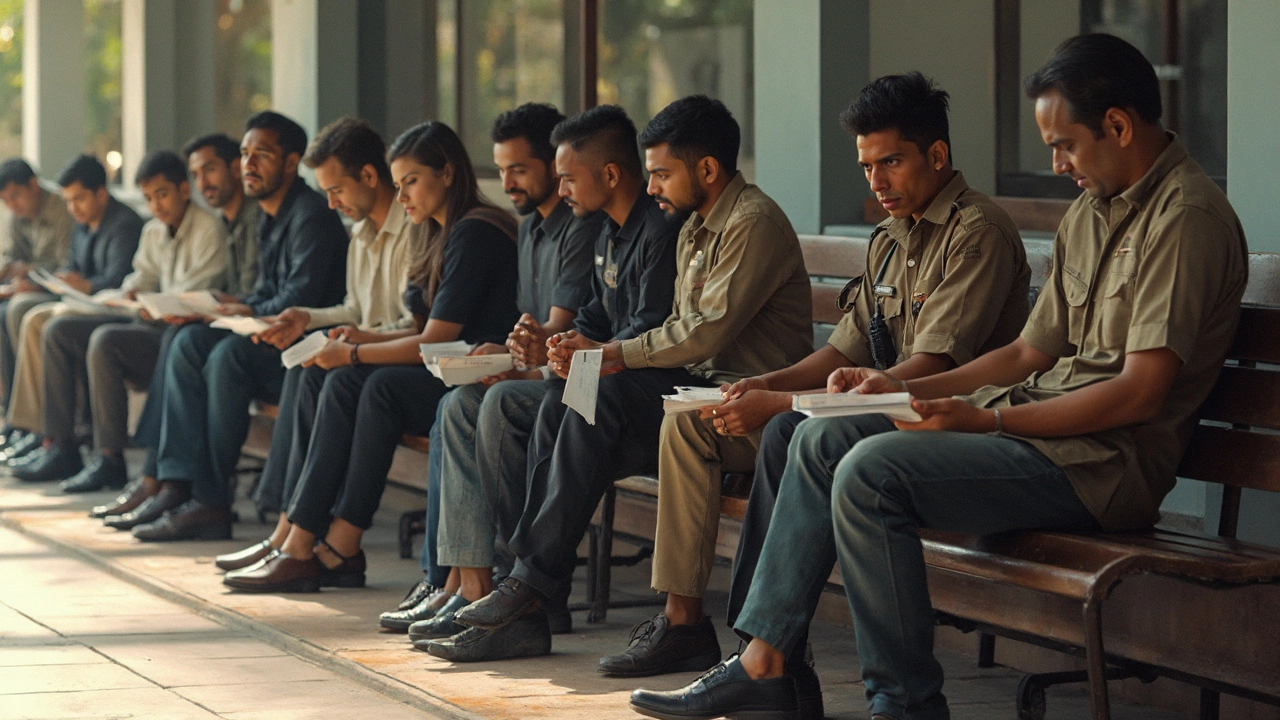
A felony on your record isn’t a tiny hiccup if you want to join the military—it’s a full-on roadblock for a lot of people. But, oddly enough, a felony doesn’t mean the door is completely locked. There are ways around it for some, but not all, and you’re going to deal with a lot of rules, paperwork, and someone seriously checking your past before you even make it to boot camp.
The military, whether it’s the Army, Navy, Air Force, or Marines, doesn’t like to take chances when it comes to background checks. They’re stricter than most regular jobs. The reason? You get handed weapons, responsibilities, and tons of trust. If someone slipped through with a violent or dangerous criminal history, that risks everything for the people around them. So, background checks are no joke.
Still, there’s a crack in the wall for some people with felonies—something called a “moral waiver.” But don’t think these are handed out like candy. Getting one depends on what you did, how long ago it happened, and honestly, if the military even wants more recruits at that moment. A waiver might give you a shot, but for some crimes, there’s no negotiation—ever. Knowing where you actually stand is way better than just hoping for a miracle.
- Who Checks Your Background in the Military?
- What Crimes Automatically Disqualify You?
- The Waiver Process: Is There a Way Around It?
- How to Improve Your Chances
- Branch Differences: Army, Navy, Air Force, Marines
- Honesty, Mistakes, and Risks
Who Checks Your Background in the Military?
If you’re thinking about joining the military with any kind of record, the first big wall you’ll hit is the background check. It isn’t just a casual glance at your past—it's a serious, official check.
Each branch has its own recruiting office, but they all use the same main system for these checks: the National Agency Check with Local Agency Checks and Credit (NACLC). This system snags details from the FBI, state police, and even city police. So, if you have any run-ins with the law—yes, even ones you think are buried—they’ll know.
Military recruiters kick things off, but once you fill out your application (called DD Form 1966), your info gets sent to:
- The Defense Counterintelligence and Security Agency (DCSA)
- The FBI’s database for criminal checks
- Local and state law enforcement for records or warrants
If you’re gunning for a sensitive or security job, your background check goes even deeper. Think financial history, foreign connections, and fingerprints—none of this gets missed.
| Type of Check | Who Handles It | What They Look For |
|---|---|---|
| NACLC | DCSA, FBI, Local Police | Criminal history, felonies, outstanding warrants |
| Security Clearance | DCSA | Financial issues, foreign contacts, drug use |
| Medical Screening | Military Medical Staff | Mental health, physical ability |
The bottom line: you can’t hide a criminal record from the people pulling your background check. The military enlistment process is built to catch anything big or small. Trying to lie or leave things out is risky—it’s a fast way to get booted and possibly blocked for life. Full honesty not only speeds things up, but it also shows you’re serious about turning things around.
What Crimes Automatically Disqualify You?
Not all crimes are treated the same when you try to join the military. Some felony convictions will block you for good—no exceptions, no waivers, no backdoors. The military takes these seriously because they show a past that puts trust, safety, or national security at risk. If you’re carrying one of these on your record, it’s a hard stop.
- Murder or attempted murder
- Sexual assault (including rape and child molestation)
- Kidnapping or human trafficking
- Treason or terrorism charges
- Any crime involving explosives or weapons of mass destruction
- More than one felony conviction, even if they’re unrelated
- Drug trafficking, especially if it’s a federal charge
These aren’t just military rules—they line up with federal law and Department of Defense policies. Recruiters don’t even have a say here. If your record lists one of these, your application stops at step one.
You’ll see that lesser felonies, like some property crimes or fraud cases, might give you a tiny shot if you can get a waiver (we’ll get to that later). But for the crimes in this list, waivers are flat-out off the table.
This isn’t just talk. The Army’s own stats from 2024 showed that out of 3,100 felony waiver requests, not a single one was granted for these automatic disqualifiers.
| Offense | Waiver Possible? | Reasons for Ban |
|---|---|---|
| Murder/Attempted Murder | No | Violence, public safety |
| Sexual Assault/Child Abuse | No | Endangers others, trust issues |
| Treason/Terrorism | No | National security risk |
| Kidnapping/Human Trafficking | No | Major criminal intent |
| Weapon of Mass Destruction | No | Extremely high threat risk |
| Multiple Felonies | No | Pattern of serious crime |
| Drug Trafficking (Federal) | No | Illegal enterprise, trust |
If you’re hoping to get a felon into the military and there’s something on this list, it’s not going to happen, no matter what story a recruiter tells you. If your conviction is for a different crime, don’t give up yet—there are some paths forward, but you’ll need to jump through hoops.
The Waiver Process: Is There a Way Around It?
If you have a felony but want to join the military, you’ll hear this one phrase a hundred times: waiver process. This is basically your only official route if your record says you shouldn't serve but you want to try anyway.
Here’s how it works. When your background check finds the felony, you don't automatically get tossed out—but you won’t move forward without a waiver. It all starts with being upfront about your past. If you hide anything, even something small, forget about getting in.
The recruiter has to sponsor your waiver request, which means they have to think you might actually have a shot and are worth extra paperwork. You’ll need to fill out a bunch of forms, write a statement about what happened, and pull together proof that you’ve changed: things like letters from employers, proof of steady work, or community service. Sometimes, you’ll go through an interview with higher-ups. It’s not instant, and it’s super common for waivers to be denied.
The actual decision goes up the chain—meaning way higher than your local recruiter. Major crimes (think drug trafficking, assault, sex offenses, or repeat felonies) almost never get green-lit. Less serious stuff, especially if you were young and it’s been years, stand a much better chance.
Here's a quick breakdown of how often waivers make a difference. Back in 2022, the U.S. Army handed out about 1,200 moral waivers to people with felony records. But that’s out of more than 130,000 total recruits—and these numbers drop a lot if recruiting goals are being met easily.
| Year | Moral Waivers (Felony) | Total Army Accessions |
|---|---|---|
| 2018 | 1,100 | 133,000 |
| 2022 | 1,200 | 132,100 |
Here’s what you actually have to do if you want a shot at a waiver:
- Tell your recruiter the truth immediately and show any court paperwork or expungement documents.
- Get reference letters from people who can vouch for you—bosses, teachers, volunteer supervisors.
- Write your own honest explanation of your past, what you learned, and how you turned things around.
- Stay out of trouble while you wait for a response. Any new problems kill your chances fast.
The bottom line—getting a felon record approved with a waiver isn’t common, but it’s not impossible. You’ve got to be patient, honest, and actually have proof that you’ve changed since your conviction. Don’t count on it, but if you’re serious, take every part of this process like it could make or break your shot at wearing a uniform.

How to Improve Your Chances
The military wants to see you’ve changed since your felony. You need to show responsibility, honesty, and commitment, or no one’s going to take you seriously. A solid background before you apply can make all the difference.
- Get your court records organized: The recruiter isn’t just taking your word for it. They’ll ask for official paperwork about your felony. Missing documents will slow everything down or tank your shot completely.
- Finish probation and parole: If you haven’t done your time or fixed all the court stuff—forget enlisting. Most branches want to see you clear all legal obligations before they’ll look at your application.
- Collect character references: Letters from community leaders, teachers, or even a steady employer can help. If someone respected in your community will vouch for you, a recruiter might think, “Okay, maybe this person deserves another shot.”
- Show a clean record since your conviction: Don’t have new run-ins with the law. Even minor stuff can wreck your chances. The longer you’ve stayed out of trouble, the better you look.
- Volunteer and build skills: Joining programs, volunteering, or picking up extra education looks good. The military loves people who hustle and want to improve themselves.
Don’t hide anything when filling out forms or talking to your recruiter. They have access to deeper records than most jobs. Lying about your past can not only kill your chance of joining, but if they find out after you enlist, you could be kicked out or even charged again. The best move is to be direct and honest from the start.
Branch Differences: Army, Navy, Air Force, Marines
If you’re wondering which branch is the easiest or hardest for a felon to join, the answer isn’t simple. Each branch has its own attitude about past crimes, and they all follow their own rules when it comes to waivers and background checks. Here’s what really sets them apart.
Army tends to be the most flexible branch when it comes to accepting recruits with a felony record. The Army’s recruitment needs are often higher, so they process more waivers than other branches. That doesn’t mean the Army will accept anything, but they’re more open to considering your story, especially if the offense happened years ago and wasn’t violent or drug-related.
The Navy is a bit stricter. They look at your record and even minor offenses can slow you down. The Navy sometimes accepts waivers, but they’re picky—especially about drug offenses, sexual crimes, and violent felonies. They want to see clear evidence that you’ve turned things around, like completed probation and years without trouble.
Air Force sets the bar the highest. It’s known for being the toughest of the main branches when it comes to background checks. The Air Force rarely gives waivers for felons, and any violent or serious offense is usually a hard no. If your offense was minor and you have a perfect record since then, it’s worth a shot—but don’t count on it.
Marines fall somewhere in between the Army and Air Force, but more on the strict side. They hand out waivers sometimes, but less often than the Army. The Marines want proof of good character, a clean stretch since your offense, and solid references. Serious or recent offenses almost always shut the door.
| Branch | Felon Waiver Chance | Notes |
|---|---|---|
| Army | Most Likely | Willing to process waivers; needs more recruits |
| Navy | Possible | Picky with drug/violent offenses; needs evidence of change |
| Air Force | Rare | Very selective, few waivers granted |
| Marines | Uncommon | Will consider but only for older, nonviolent cases |
One huge thing: the rules change all the time based on how many people they need to fill spots. In slow years, even the Army tightens up. So if you’re thinking about it, talk to a recruiter about your specific case. And always be upfront about your criminal record. If you try to hide it, you’ll be booted before you get started and probably banned from ever reapplying for any military enlistment.
Honesty, Mistakes, and Risks
It might feel tempting to hide your past felony when trying to join the military, but that’s the worst move you could make. All branches run background checks through the FBI and other databases—there’s nowhere to hide. If you lie on your forms or during your interview, you’re not just risking rejection. If the military discovers the lie later, you could face a dishonorable discharge, lose any benefits, and even get criminal charges for fraud.
Here’s the real kicker: a lot of folks think old charges won’t show up, especially if they happened as a juvenile or years ago. But the military digs deep. Even sealed or expunged records sometimes pop up, especially on a federal check. Recruiters have seen it all, so honesty is the only option that can actually work in your favor.
- Always list every conviction, even ones you think were minor or “wiped.”
- Mistakes on your paperwork can get your whole application thrown out—even ones that seem tiny.
- Trying to “forget” a serious offense might block you from all federal jobs in the future, not just the military.
Some people try to explain away their record, blaming others or saying it’s a mix-up, but recruiters want to see ownership. Show that you’ve changed since your conviction and you’re taking steps to stay out of trouble. It’s not a guarantee, but the military actually prefers people who can honestly share their story, take responsibility, and show real improvement.
If you do get turned down because of your record, don’t try to sneak in with a fake identity or by lying on documents. Besides being illegal, you wouldn’t last long—military background checks for a felon are among the toughest out there. Sometimes it’s smarter to ask about alternate routes, like civilian defense jobs or apprenticeships, instead of tanking your future with a risky move.
More Articles

Which State Performs Best in NEET? A Straightforward Look at Rankings and Reasons
This article breaks down which Indian states consistently top the NEET exam charts and digs into why some outperform others. It covers the numbers, talks about coaching trends, and checks what really drives high success in NEET. You'll find tips if you're looking to boost your NEET prep, plus some lesser-known facts about top states. Whether you want coaching advice or just the raw stats, this guide keeps it real and practical.

Unlocking Government Employment: Essential Tips and Insights
Navigating the path to securing a government job can be a daunting process, filled with challenges and competition. This article offers valuable insights into the hiring practices of government agencies. Readers will learn about the essential qualifications and skills needed to stand out in the application process. Additionally, practical tips will be provided to improve one's chances of successfully securing a government position. Understanding the intricacies of government hiring can significantly boost an applicant's confidence and capability.

Best Teacher for NEET: How to Find the Right Guide for You
This article explores what really makes a teacher the best choice for NEET coaching. It looks at key qualities to watch for, shares what top students prefer, and compares famous coaching names. You'll find real tips on checking reviews and asking smart questions before joining a class. If you're lost in the NEET coaching crowd, this guide cuts through the noise and helps you find what suits your learning style and needs.
